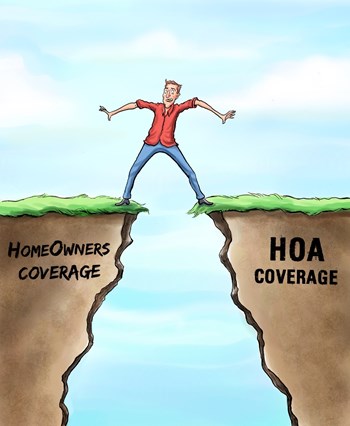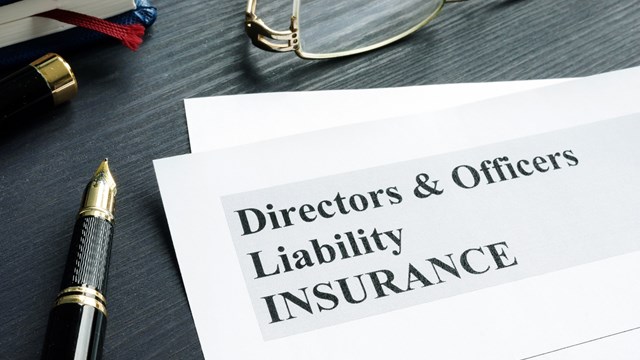
Insurance is designed to be there for us when we need it most. Without knowing the full extent of our coverage, though, we may find ourselves with less protection than we thought. For condominium owners, it is imperative to understand exactly what liabilities and risks are covered by individual resident homeowner policies and what is covered by the building’s policy. Unfortunately, many co-op and condo residents misinterpret who is responsible for what.
“For owners that have owned in other communities, there is generally a misconception that the “new” location has the same insurance requirements as their previous location,” says Charles Stults, president of Allen & Stults Co. Inc., an insurance agency in Hightstown. “There is also typically an incorrect assumption that the unit owner’s insurance requirements are the same as their maintenance requirements. Many times this is even misunderstood by directors and management. The greatest number of incidents damaging property is from water damage. Many others believe that if the damage is from another unit or from a backup that neither they nor their insurance is responsible for cleanup and repair,” he says.
Sal Sciallo, an agent with State Farm Insurance in Manalapan, adds that too many residents rely on the master policy to cover their property and belongings. This practice however, can lead to big bills in the event of an incident such as fire or damage, when the resident is not covered adequately or at all.
“A lot of times, there may be a high deductible. So if there is a five or ten thousand dollar deductible and their loss falls under that, there is no claim. There is a misconception that residents think they always have coverage through the master policy,” he says.
“Some association policies, not all,” he continues, “do not cover improvements and betterments. So if residents upgrade their kitchen counters or floors, it would not be covered.”
Knowing exactly what is protected and by whose policies is imperative in ensuring that properties and possessions are in good hands should an emergency arise.
Know Your Insurance
In order to avoid problems later, it is important for unit owners to learn as much as they can about their own policy, their building’s policies and where any gaps may exist.
“It is imperative that the owner, whether co-op or condo, receive a copy of an insurance explanation provided by the insurance broker or management. This needs to clearly outline what the master insurance covers, what it does not cover, the master insurance deductible amount and who is responsible for the association’s deductible. Nearly every association has some differences from other associations, no two being identical,” says Stults.
In general, a resident must insure their personal property as well as any changes they make to the unit, often referred to by insurance companies as improvements and betterments. “Once the unit owner or shareholder attaches something new to their unit, it becomes their property and the value of that has to be included in the improvements and betterments section of the homeowner's policy. Going from there, each person furnishes their unit differently and needs to estimate how much it would cost to replace or repair their property,” says Arthur Schwartz, senior vice president of Masters Coverage Corp., an insurance brokerage with clients in New York and New Jersey. He cites that clothing, window treatments, and furniture are all considered personal property and need to be appraised and insured. To illustrate Schwartz says, “if you turn the apartment upside down, that which would fall down would be your personal property, that which would remain affixed, are the improvements and betterments.”With each policy being unique to the association, what will and will not be covered in the case of damage or catastrophe will be determined by the policy itself.
“It is my opinion that a good association insurance policy will rebuild a unit as it existed at first conveyance from the developer to the original unit owner. This would therefore include all exterior and interior elements, fixtures and appliances, but not the value of any upgrades made by the current or any prior owner,” says Stults. “It also must be remembered that no matter how broad an association or unit owner’s policy is, no policy covers everything. Wear and tear, construction defects, age, rot, fungus, mold, deterioration, leaks, damage from bugs, insects or vermin, sinking, cracking and collapse are not covered by insurance, to only mention a few. Flood and earthquake are typically excluded except if purchased separately by the association or unit owner.”
A Two-Way Street
Understanding the ins and outs of these policies will avoid surprises later. “Residents are all part owners of the association and therefore need to be educated regarding the breadth and limitations of the master insurance. Risk management and loss control education is extremely important as well. Poor practices lead to losses, both property and liability, which raises the cost and availability of insurance. Increased costs and uninsured risks can affect the economical viability and marketability of a condo or coop community,” says Stults.
Sciallo often holds Q&A sessions for boards and residents interested in learning more about both their building and individual policy. This practice allows residents to ask questions and obtain clarifications on what exactly is covered by each. “I can look at their policies and see if there are gaps; if they need to add something or don't need something, if they are too low or too high in certain places,” he says.
Stults adds that it is, “both impractical and dangerous for every unit owner to get a copy of the policy as it would also have to be provided annually and when any changes were made. The better method is for the association to provide to the unit owner with an explanation of what is and what is not covered including the name of the insurance company and broker with a phone number. This is best produced by the insurance broker and provided to the association for distribution.”
If a unit owner or shareholder does make a request to see the policy, many insurance companies will wait for approval from the board or manager before releasing a copy of the policy, says Schwartz.
It is the responsibility of the unit owner to do their own investigating when it comes to personal versus building coverage.
Sciallo says that while a building’s insurance information is generally not made available to residents, “you can contact the management or the property manager and ask, 'Who is your carrier? What types of coverages do you have? Can I speak to the agent and can he or she give us an outline?'”
He adds that most agents, such as himself, do make themselves available to residents should they have any questions about the master policy versus their own individual homeowner's coverage.
Sciallo suggests that managers and board members as well as unit owners consult on a regular basis with their insurance agents. “It is always good to meet a couple weeks before the renewal and see if there are any improvements or betterments that have been done, if there are any vacancies in units,” he says. That way coverage can be accurate and the agent can update the policy to make sure it adequately covers the building and residents.
“At a minimum,” Stults adds, “there needs to be an annual review of an association’s insurance program. Our brokerage’s practice is a minimum of a pre-renewal review well in advance of the budget cycle, a post renewal review and a separate meeting especially for new directors.”
Ensuring Coverage
For associations, the goal is to have not only their own insurance responsibilities in order but to encourage unit owners to have their individual policies in order as well. Sciallo says that in New Jersey, homeowner’s insurance is not a requirement. “It is more of a mortgage or lender's requirement. People who buy a condo and don't have a loan don't need it, unless the association bylaws or resident's handbook makes it mandatory.”
Although homeowner's insurance is technically not required, “I think it is a terrific idea to have in the resident handbook a requirement that says residents need to submit a current copy of their insurance certificate. It helps the association manage their insurance loss,” Sciallo says.
When it comes to the things that matter to us most, insurance is imperative in protecting not only our homes and our possessions but our peace of mind.
“Many people are proud of their homes and the money they put into them, but when it comes to insurance, they often underestimate the value of their belongings and property,” says Schwartz.
Knowing what is and is not covered and what we can do to make sure all bases are covered is absolutely key in being prepared for the rainiest of days.
Liz Lent is a freelance writer and a frequent contributor to The New Jersey Cooperator. Editorial Assistant Maggie Puniewska contributed to this article.






Leave a Comment